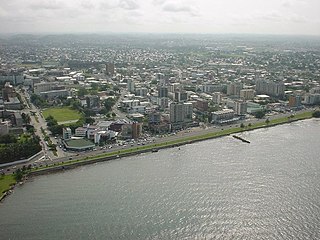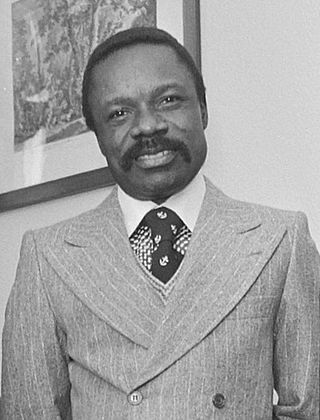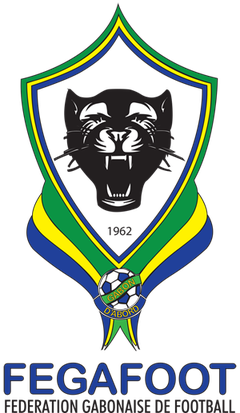
Gabon, officially the Gabonese Republic, is a country on the west coast of Central Africa. Located on the equator, it is bordered by Equatorial Guinea to the northwest, Cameroon to the north, the Republic of the Congo on the east and south, and the Gulf of Guinea to the west. It has an area of nearly 270,000 square kilometres (100,000 sq mi) and its population is estimated at 2.3 million people. There are coastal plains, mountains, and a savanna in the east.
Little is known of the history of Gabon prior to European contact. Bantu migrants settled the area beginning in the 14th century. Portuguese explorers and traders arrived in the area in the late 15th century. The coast subsequently became a center of the transatlantic slave trade with European slave traders arriving to the region in the 16th century. In 1839 and 1841, France established a protectorate over the coast. In 1849, captives released from a captured slave ship founded Libreville. In 1862–1887, France expanded its control including the interior of the state, and took full sovereignty. In 1910 Gabon became part of French Equatorial Africa and in 1960, Gabon became independent.

The economy of Gabon is characterized by strong links with France, large foreign investments, dependence on skilled foreign labor, and decline of agriculture. Gabon enjoys a per capita income four times that of most nations of sub-Saharan Africa, its reliance on resource extraction industry releasing much of the population from extreme poverty.

Libreville is the capital and largest city of Gabon. Occupying 65 square kilometres (25 sq mi) in the northwestern province of Estuaire, Libreville is a port on the Komo River, near the Gulf of Guinea. As of the 2013 census, its population was 703,904.

The president of Gabon is the head of state of Gabon. A total of three people have served as president since the post was formed in 1960.

El Hadj Omar Bongo Ondimba was a Gabonese politician who was the second President of Gabon for 42 years, from 1967 until his death in 2009. Omar Bongo was promoted to key positions as a young official under Gabon's first President Léon M'ba in the 1960s, before being elected Vice-President in his own right in 1966. In 1967, he succeeded M'ba to become the second Gabon President, upon the latter's death.

The flag of Gabon is a tricolour consisting of three horizontal green, yellow and blue bands. Adopted in 1960 to replace the previous colonial flag containing the French Tricolour at the canton, it has been the flag of the Gabonese Republic since the country gained independence that year. The design of the present flag entailed the removal the Tricolour and the widening of the yellow stripe at the centre.

The Gabon national football team represents Gabon in men's international football. The team's nickname is The Panthers and it is governed by the Gabonese Football Federation. They have never qualified for the FIFA World Cup, but have qualified eight times for the Africa Cup of Nations. The team represents both FIFA and Confederation of African Football (CAF).

.ga is the country code top-level domain (ccTLD) for Gabon.

The Prime Minister of Gabon is the head of government of Gabon.

Ali Bongo Ondimba, sometimes known as Ali Bongo, is a Gabonese politician who is the third and current president of Gabon since October 2009.

Gabon has competed in eight Summer Olympic Games. They have never competed in the Winter Olympic Games. On August 11, 2012, Gabon won its first Olympic medal when Anthony Obame took silver in Taekwondo at the 2012 Summer Olympics.

Gabon – United States relations are bilateral relations between Gabon and the United States.

Christianity is the predominant religion in Gabon, with significant minorities of the adherents of Islam and traditional faiths.
Miss Gabon is a national beauty pageant in Gabon. The pageant was established in 2001 by Défis de femmes.

Most visitors to Gabon must obtain a visa in advance, either from one of the Gabonese diplomatic missions or online.
The Military ranks of Gabon are the military insignia used by the Armed Forces of Gabon. Being a former colony of France, Gabon shares a rank structure similar to that of France.

Gabon–India relations are the international relations that exist between Gabon and India. Gabon maintains an embassy in New Delhi. The Embassy of India in Kinshasa, Democratic Republic of the Congo is jointly accredited to Gabon. India also maintains an honorary consulate in Libreville.

On 7 January 2019, members of the Armed Forces of Gabon announced a coup d'état in Gabon. Military officers claimed that they had ousted President Ali Bongo, who was re-elected in 2016 after a controversial election and protests. During the absence of Ali Bongo, who was receiving medical treatment in Morocco, armed rebels in the capital city Libreville took hostages and declared that they had established a "National Restoration Council" to "restore democracy in Gabon". Widespread internet outages occurred throughout the country, though it is unknown whether the Internet was shut down by the rebels themselves or by civilians. Gabon's government later declared that it had reasserted control.
The COVID-19 pandemic in Gabon is part of the ongoing worldwide pandemic of coronavirus disease 2019 caused by severe acute respiratory syndrome coronavirus 2. The virus was confirmed to have reached Gabon in March 2020.












